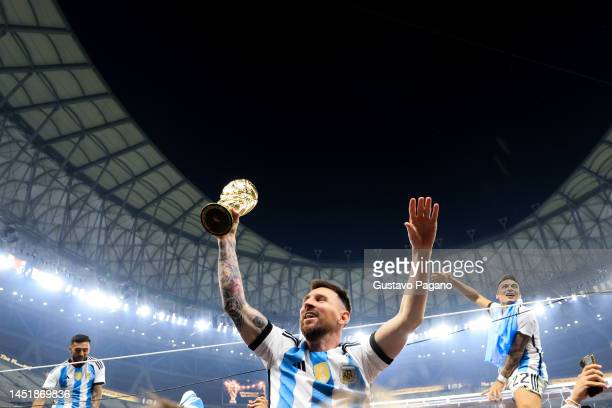Lionel Messi finally had his crowning moment, as he hoisted the World Cup trophy above his head to the adoration of crowds in the Argentine capital, Buenos Aires.
For years, the 35-year-old had been let down by the supporting cast on offer, with the expectation of a nation falling solely upon his shoulders.
Finally, he cemented his place as the undisputed greatest of all-time in the eyes of the masses.
Although he was at his usual magnificent best, winning the golden ball, the award for the best player of the tournament, he was not without help, this time.
Five of Argentina's 26-man squad ply their trade in the England's top-flight and each of them played their part in the nation's first triumph in the World's most prestigious competition for 36 years.
As the league campaign restarts after the break for the showcase in Qatar, VAVEL analyses the impact those players made, highlights a member of the squad that could feature on British shores soon and a manager that you may not know played in the Premier League.
-
Argentina's Sergio Ramos?
Aston Villa goalkeeper Emiliano Martinez will go down in Argentine football folklore after his penalty shootout antics.
The 30-year-old was playing his football in League Two with Oxford United a decade ago, before failing to usurp the likes of Wojciech Szczesny and Bernd Leno at Arsenal.
It has been a long road to becoming a world champion, but the role he played was integral.
Whilst his performance in the shootout caught the headlines, his save to deny Randal Kolo Muani in the dying embers of extra-time was even more sensational.
The addition of "a real world-class keeper arguably proved the final piece of the puzzle to break the nation's long trophy drought," according to GOAL's Argentina correspondent Daniel Edwards.
In response to criticism of his antics in the win over France, Edwards argues that they have "only heightened the legend and as far as fans in Argentina are concerned, long may they continue."
"He is one of those players in the Sergio Ramos mould, loved by his fans, loathed by his rivals, and that is definitely the case here where his popularity [back home] ranks probably only second to Messi."
-
Defence: the best form of attack?
Whilst Tottenham Hotspur's Cristian Romero was a key figure in an Argentine defence that conceded just seven goals in Qatar, Manchester United's Lisandro Martinez started just twice.
Martinez featured in five matches overall, the 2-0 victory over Mexico and the penalty shootout win in the quarter-final against The Netherlands.
The Tottenham man started in six of his nation's seven matches, featuring as a substitute in the aforementioned win over El Tri.
Romero started and played the full final, however the fact that Lionel Scaloni's side were chasing the winner in an attempt to stop the match from going to a penalty shootout, denied the United man from seeing the pitch.
In the opinion of Edwards, putting faith in Romero was a key factor in the triumph, citing the performance in the loss versus Saudi Arabia, "where he was clearly unfit and struggling," as evidence of his importance.
"That being said, it was a team effort to shore up the defence. The entire midfield and attack pulled its weight, even Messi made a few interventions to keep the ball well away from the Argentina goal almost the entire tournament," he added.
-
The unexpected hero
Brighton's Alexis Mac Allister was arguably the breakout star of the tournament.
The 24-year-old has five goals in 14 Premier League appearances so far this season, however he had never had an opportunity on the global stage before.
He took his opportunity to announce himself on the biggest stage of them all, providing the kind of creative threat in midfield that Argentina have lacked since Juan Román Riquelme retired, in the words of Edwards.
"He has all the talent to go a long way, Brighton are likely to be fielding some huge offers for him in the near-future," he added.
-
La Arana lightens Messi's burden
Manchester City's Julian Alvarez impressed at the tournament with four goals, ensuring that the burden on Messi's shoulders was not as heavy.
His fellow striker, Lautaro Martinez could not find his shooting boots, and as a result, Edwards claims that the 22-year-old's presence was even more important.
"That's why having someone like Alvarez in the wings is so crucial, he seemed not to have a care in the world and took his chances fantastically, while also getting that all-important good fortune which eluded Lautaro," he said.
"His four goals were key, making sure that not only Messi had to step up – while his tireless running doubtlessly helped the No. 10 focus solely on what he does so well, unlocking opposition defences."
-
Destined for the Premier League?
Rather aptly named Enzo, like the Ferrari supercar, Benfica midfielder Enzo Fernandez took home the award for the best young player at the tournament.
The reported Liverpool, Real Madrid, Manchester United, Manchester City, Chelsea and Arsenal target outshone the likes of Jude Bellingham and Josko Gvardiol to clinch the award.
The 21-year-old will go far in the game in the future, according to Edwards, who refers to him as the 'complete midfielder'.
"While Enzo was probably the best player in Argentine football in 2022 prior to his Benfica move, and then adapted effortlessly in Europe, it was hard to imagine he'd make that much of an impact at 21 and in his first steps with the national team," he added.
Lionel Scaloni, now one of only three Argentina managers to win the beautiful game's biggest prize, had an ill-fated spell at West Ham in 2006.
He made 13 appearances for The Hammers including starting the 2006 FA Cup final defeat to Liverpool.
He also featured in his nation's squad for the 2006 World Cup finals in Germany, in the same squad as Messi.
When he was first appointed as the manager of La Albiceleste in 2018, it was underwhelming, to say the least.
It came after a spell as interim manager after the sacking of Jorge Sampaoli, who he had worked under, he was never expected to be a serious candidate for the permanent role.
Many fans and pundits favoured the likes of Mauricio Pochettino or Diego Simeone, managers that had established themselves with clubs in European football however finances restricted the Argentine FA to giving the role to Scaloni.
Footballing and Argentine royalty, Diego Maradona slammed the appointment, claiming that Scaloni could not direct traffic, never mind manage the national team.
However, the 44-year-old has now won the Copa America and the World Cup.
Now, having guided Messi and his cohorts to their first World Cup trophy, Scaloni will go down in the pantheon of great managers.
He has adapted his team's tactics to suit their opponents, not just for different matches, but within games too, offering 4-4-2, 4-4-3 and 5-3-2 systems within the same match.
Edwards heralds this tactical nous, stating that "Scaloni's flexibility and ability to read opponents and set up accordingly was a fantastic tool for Argentina throughout the tournament."
"We all knew Scaloni's value as coach in terms of bringing this team together, fostering a collective spirit, but to see him outsmart such wily figures as Van Gaal, Dalic and Deschamps and allow his team to dominate the first 80 minutes of all those games was a huge and pleasant surprise and speaks very highly of him," he added.
The influence of the manager cannot be underestimated, even if the players mostly take the plaudits.










































